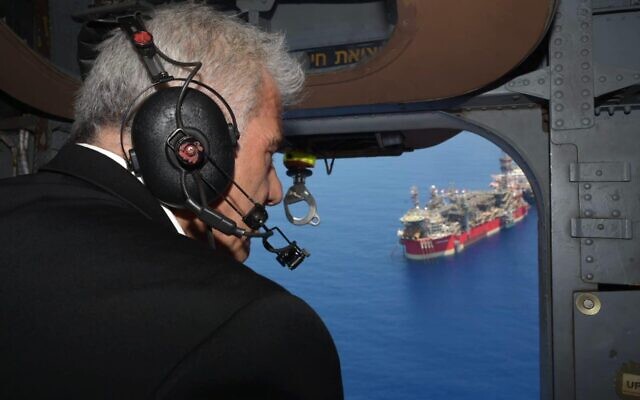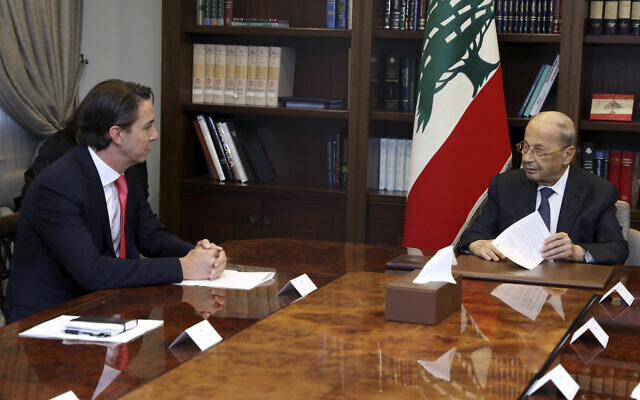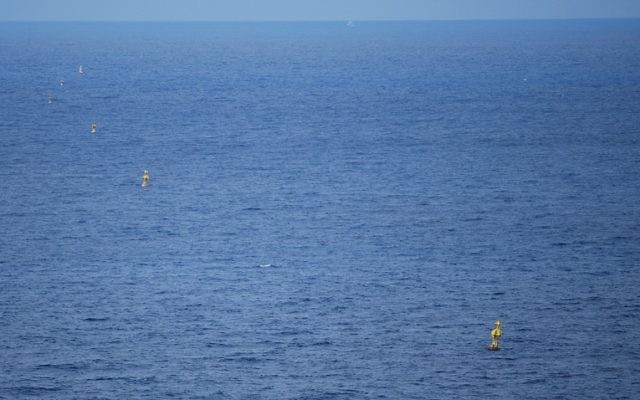US says it is continuing ‘robust engagement’ to reach deal after Israel rejects Lebanon’s proposed changes; Hezbollah has threatened Israel for months over disputed gas

Defense Minister Benny Gantz ordered Israeli troops on alert in the country’s north on Thursday amid setbacks in the effort to reach a maritime border deal with Lebanon.
Gantz held a situational assessment with IDF Chief of Staff Aviv Kohavi and other security officials after Israel said it would not accept Lebanon’s proposed amendments to a US-brokered deal.
“The defense minister directed the IDF to prepare for a scenario of escalation in the north, both offensively and defensively, given the developments in the negotiations on the maritime border,” a statement from Gantz’s office said.
The security establishment is already dealing with increased violence in the West Bank and Jerusalem amid the Jewish High Holidays.
For several months, Hassan Nasrallah, leader of the Hezbollah terror group, threatened to attack Israel if it begins drilling in the disputed Karish gas field. Nasrallah appeared to back away from his threats during a televised speech on the weekend after the US delivered its draft agreement to the two sides.
However, Prime Minister Yair Lapid rejected Beirut’s desired modifications to the proposed deal on Thursday, casting fresh doubts on the viability of reaching an accord.

Contradicting earlier assertions by Western officials that Lebanon’s objections were minor, a senior Israeli official called Beirut’s demands to changes “significant.”
Lapid emphasized that he would not compromise Israel’s economic and security interests, even if it meant that there would be no deal in the near term, according to the official.
Former National Security Council chair Brig. Gen. (res) Yaakov Nagel told the Israel Hayom daily on Thursday that Israel was “still far from a military confrontation” on the northern border.
“In contrast to Nassrallah’s bragging, a confrontation is the last thing the Hezbollah head wants. He is very interested in an agreement and the ability to appropriate it to himself, but not in military skirmishes with Israel at this stage,” Nagel asserted, while adding that the terror chief should be made aware of the severe consequences that would result if the group violated Israel’s sovereignty.

The White House said Thursday that talks have reached a “critical stage” and that US envoy Amos Hochstein remains in close contact with both sides.
“Special Presidential Coordinator Amos Hochstein continues his robust engagement to bring the maritime boundary discussions to a close. We remain in close communication with the Israelis and Lebanese,” said a White House National Security Council spokesperson.
“We are at a critical stage in the negotiations and the gaps have narrowed. We remain committed to reaching a resolution and believe a lasting compromise is possible,” the spokesperson said.
A European diplomat told The Times of Israel on Thursday that the deal was not completely off the table yet, but may be postponed.
“Both sides have shown their interest in finding a middle ground in the last weeks, and it would be a pity to witness the failure of negotiations given its recent progress,” the diplomat added.
Citing unnamed government officials Tuesday, the pro-Hezbollah daily Al-Akhbar reported that Beirut did not agree to recognize Israel’s buoy-marked boundary — which Jerusalem unilaterally placed five kilometers off of the coast of the northern town of Rosh Hanikra in 2000 — as an international border.

The report claimed Beirut was also against the idea of demarcating a land border as part of the agreement, and insisted that the issue must instead be reserved for discussions with the United Nations.
Furthermore, it said Beirut wants the French Total Energy company to work with Lebanon independently from its work with Israel, likely taking issue with the reported compensation Israel will receive from energy companies in exchange for giving up rights to the Qana offshore gas field.
Finally, Lebanon reportedly objects to a proposed signing ceremony alongside Israeli officials in the Lebanese city of Naqoura. Instead, officials countered that a deal should be signed with officials from the two sides in separate rooms, since Israel and Lebanon do not have diplomatic relations and are technically at war.
The deal has come under fire from opposition leader Benjamin Netanyahu, who labeled the agreement “illegal” and accused Lapid on Monday of giving up “sovereign territory of Israel,” vowing that a potential future coalition led by him “won’t be bound by it.”
Last month, Lapid’s office vowed Israel would go ahead and extract gas from Karish with or without any final deal on the maritime border dispute.
As reported by The Times of Israel
